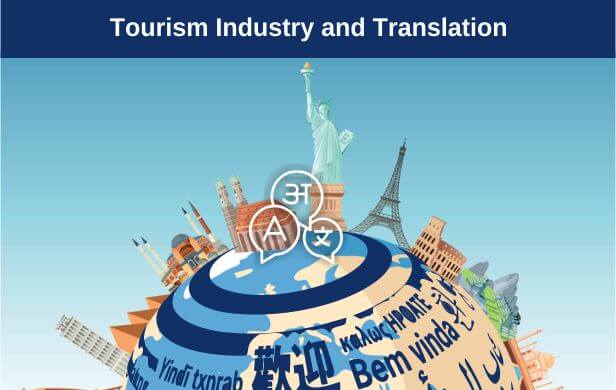
As one of the world's largest and most dynamic sectors, international tourism obviously has an impact on all facets of social interaction, including language. The growth of international tourism has resulted in an increased need for language services in the industry.
Language has the ability to influence a tourist's decision when arranging a vacation, especially if the tourist does not speak the language of the nation they are visiting. People want to know exactly what they are signing up for in order to have a successful trip. This means they are more inclined to choose a company that provides information in their native language. As a result, many tourism businesses seek to provide information in multiple languages. This allows businesses to attract more consumers by providing precise information to tourists, giving them the confidence to book the required services.
Businesses that benefit from tourists must be able to communicate effectively in multiple languages in order to serve international travelers. Here are a few easy ways that tourism translation can benefit the travel and tourism business.
First and foremost, reaching out to clients in their native language will help them locate you-so your website, ads, apps, should all be localized in your clients languages.!
Since travelers increasingly utilize the internet to plan their vacations, having a website in various languages is advantageous. Search engines such as Google and Bing prioritize the data that appear on the first page of a search based on relevance. So, provide a page on your website in the vernacular and diverse languages to ensure clients locate you.
When clients contact you, assist them in learning about your services. Translating marketing materials for a tourism bureau or a restaurant can help attract travelers.
They will be more inclined to avail services if they can get the required information! Naturally, tourist guides are one of the more evident needs in tourism translation.
While it is important to identify and cater to the languages spoken by tourists in your area, don't stop there. Understand the demand and need of the market and market services accordingly. Asian tourists, for example, are one of the largest and fastest-growing tourism markets.
If you are in the tourism industry, it is a profitable market for a specific target audience. Aside from website and menu translation, services such as interpreting can also help enhance tourism.
Without a doubt, the Internet is at the heart of today's tourism sector. This makes word-of-mouth marketing as simple as a few mouse clicks. At the same time, negative evaluations can be a nightmare for a restaurant or tourism company. Given this, it is now more vital than ever for businesses and organizations to get their translations correctly. The humorous value of botched translation cannot compete with professionals that hit the mark. Even a simple mistake in translations can cost you your reputation in the industry.
Tourists from all over the world flock to places such as Paris, New York City, and Cancun. Competition is fierce in cities with a high visitor influx. Having items in the local language of your guests will increase the likelihood of them eating or staying at your establishment.
Having a concierge who speaks more than one language will increase the visibility of your institution.
Despite the fact that English is becoming increasingly international, giving pamphlets, menus, or signs in different languages makes guests feel less overwhelmed and welcome. When these materials areIt is critical to establish a friendly environment for guests, and giving documents in their native language will make their stay that much easier.
Many individuals are afraid of visiting a new nation, yet traveling to new locations and having multicultural experiences are becoming increasingly important to many and the language barrier will not stop them. Making connecting flights, ordering from a menu, or using public transportation in a new city might be stressful, but when signage and written materials are professionally translated into various languages, they become less so.
Tourists can get easily confused when confronted with poorly translated signs (after a burst of laughter, of course). "What are they attempting to convey to me?" The accuracy of translations can be important for getting to the airport on time or entering the correct toilet. When visitors travel on vacation, they want to have a stress-free time, but when they can't find where they need to go for example, it might lead them to a lot of trouble.
Using Google Translate or a person who is partially multilingual can be detrimental to an establishment. You may have seen such disasters of incorrect translations on the Internet. Low-quality translations may drive tourists away, and for good reason.
Poor translations can lead to individuals taking the wrong train, ordering something they are allergic to, or even jumping off a cliff (if you are someone who follows the instructions on all printed signs). As a result, safety is an important consideration when translating. Machine translation is susceptible to errors, but skilled human translators can assure that the message is transmitted correctly and that visitors will understand.
Make your content attractive to travelers from all over the world! With translations available in more than 120 languages, Language Services Bureau can help you write, edit and translate tourism content while guaranteeing quality services. This Tourism Day, improve your business with Language Services Bureau by your side!
For any queries related to language translation services. Inquire at our email address below or give us a call today!
info@languageservicesbureau.com
Telephone: +91-20-24470509, +91-82370 60559
Similar articles for you...

आमच्या गेल्या महिन्यातील ब्लॉग मध्ये भाषांचे ज्ञान आवश्यक असणाऱ्या करियर क्षेत्रांची माहिती आपल्याला मिळाली. जिथे भाषेचे ज्ञान फायद्याचे ठरते असे इतर व्यवसाय आपण या महिन्यात पाहुयात.

Posted by : Language Services Bureau

The time it takes to learn a language depends on what you want to do with it– here is a great article about language learning and the kind of expectations you can set about the time required for the same!